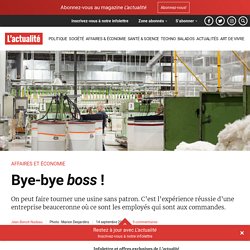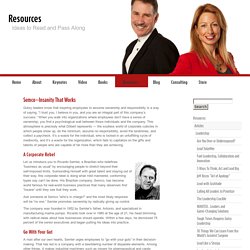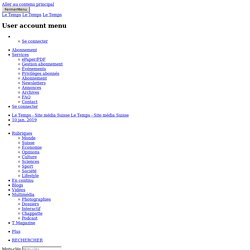

Engageriez-vous votre patron? Recherche avancée Enjeux Engageriez-vous votre patron?

Dossier proposant une réflexion sur la gestion des ressources humaines. Témoignages d’ouvriers et de patrons, recueillis dans diverses usines québécoises et chez Semco, au Brésil, montrant que les entreprises possédant le meilleur bilan sur le plan de la productivité et de la qualité sont celles où les employés sont respectés et ont plus de responsabilités. Cela suppose à la base des changements dans la culture de l’entreprise. Épisode du 23 février 1994. 1994 00:47:47 15-17 Ajouté le: 1 mai 2014 Désolé, l’accès au contenu du portail Curio.ca est réservé aux abonnés. Métadonnées Sujets Équipe Pierre Maisonneuve (Animation), Pierre Craig (Journaliste), Roger Archambault (Réalisation), Luc Paradis (Réalisation), Jean-Luc Paquette (Réalisation-coordination) Sous-titrage Non disponible Notice MARC Visionner Télécharger Peut être trouvé dans Catégories À propos Infolettre Liens utiles Contactez-nous Soumettre une demande.
Semco. Affaires et économie. À Régitex, il n’y a plus ni PDG, ni vice-présidents, ni même de directeurs.

Dans cette filature ultramoderne de Saint-Joseph-de-Beauce, tout le monde prend des décisions. Que ça concerne les machines ou la technologie, ou encore les finances ou les ventes, c’est la centaine d’employés qui tranchent en comités. « Je ne décide plus rien », dit Lisa Fecteau, 56 ans, l’ex-PDG devenue simple propriétaire. « Notre devise, c’est : “Celui qui sait fait”. Le patron ne peut pas tout savoir et tout régler. » Managing Without Managers. In Brazil, where paternalism and the family business fiefdom still flourish, I am president of a manufacturing company that treats its 800 employees like responsible adults. Most of them—including factory workers—set their own working hours. All have access to the company books. The vast majority vote on many important corporate decisions. Everyone gets paid by the month, regardless of job description, and more than 150 of our management people set their own salaries and bonuses.
This may sound like an unconventional way to run a business, but it seems to work. Management associations, labor unions, and the press have repeatedly named us the best company in Brazil to work for. When I joined the company in 1980, 27 years after my father founded it, Semco had about 100 employees, manufactured hydraulic pumps for ships, generated about $4 million in revenues, and teetered on the brink of catastrophe. How did we do it and survive?
We may also be too specialized. Semco—Insanity That Works. Gutsy leaders know that inspiring employees to assume ownership and responsibility is a way of saying, “I trust you, I believe in you, and you are an integral part of this company’s success.”

When you walk into organizations where employees don’t have a sense of ownership, you find a psychological wall between those individuals and the company. This atmosphere is precisely what Dilbert represents — the soulless world of corporate cubicles in which people show up, do the minimum, assume no responsibility, avoid the landmines, and collect a paycheck. It’s a waste for the individual, who is locked in an unfulfilling cycle of mediocrity, and it’s a waste for the organization, which fails to capitalize on the gifts and talents of people who are capable of far more than they are achieving. A Corporate Rebel Let us introduce you to Ricardo Semler, a Brazilian who redefines “business as usual” by encouraging people to stretch beyond their self-imposed limits.
How Brazil Has Taken Workers' Rights to a New Level. QU'EST-CE QUE C'EST, LA VIE CHEZ UBISOFT MONTRÉAL? ep.1. Ricardo Semler, le patron qui prêche de prendre des pauses pour mieux pouvoir agir. Ricardo Semler n'est pas un patron comme les autres.

Ce millionnaire brésilien de 44 ans est un inconditionnel de la paresse, qu'il prêche dans son dernier ouvrage*, dont le titre anglais est éloquent: The Seven Day Weekend. «Je défends l'inactivité, pas la paresse, rectifie-t-il. Le fait de prendre une pause pour réfléchir à ce que l'on fait. C'est là qu'on résout bien des problèmes.» Et cette inactivité, il la prêche tant pour lui que pour ses employés. Ici, pas de nombre fixe d'heures de travail non plus. Méthode militaire abolie. Ubisoft Fun House – A laboratory for game concepts. The Fun House division was originally meant to develop casual games but quickly executives at Ubisoft Montreal decided to open the division up.

Here employees explain what is great about this innovative approach. Readers may already be familiar with the Fun House, launched last year at Ubisoft Montreal. Fun House is a unique space within the studio, a laboratory for original casual and hardcore game concepts, built by small teams. Essentially, it’s a space for teams to try out an idea, prototype, push forward quickly, get things wrong, make things better, and hopefully come up with an exciting new game experience. We caught up with the team to find out how things have evolved over the past few months. One of the main focuses at Fun House at the moment is VR as the division is used to work in small teams and iterate fast. Patrick Plourde on why to embrace failure and why gameplay mechanics are most important As time goes by and projects move forward, we’re learning a lot!